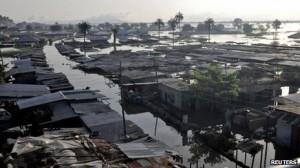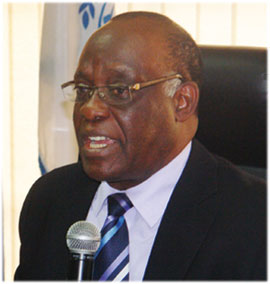Close to tears, Dr. Anthony Anuforom, Director-General of the Nigerian Meteorological Agency (NIMET), last week in Lagos recalled how his warning on the impending flood disaster was handled with a pinch of salt by 15 state governors.

Anuforom told a bewildered audience at the Eight Annual Meeting of the African Science Academies (AMASA 8) that, drawing from a NIMET prediction in March, he personally wrote the governors on the dangers of the coming flood and what needed to be done. He said he ensured that the letters were delivered.
But, to his amazement, he added, none of the 15 governors wrote or called to acknowledge the receipt of the correspondence. He did not disclose the identity of the governors.
Numerous states in the country were hard hit by the recent flood disasters occasioned by the high intensity rains, along with the release of water from major dams within and outside the country. Consequently, NIMET came under severe criticism for the mishap. But Anuforom declared that the agency should not shoulder the blame alone.
His words: “Nobody took me seriously. I personally alerted governors of 15 states in this country, I wrote them. I did. I did not delegate it to anybody. I also made sure they got the letters. I informed them on what they needed to know and what they needed to do about the impending flood disaster. I did not get one acknowledgement. The rest is history. We did shout; maybe not enough.”

Anuforom called for a national for climate service which, he said, would establish a situational relationship, and link climate data-providing agencies like his with users of such data.
He said: “Part of the problems is that there was an obvious gap. There is no formal policy connecting service providers (like NIMET) with the users of the information. The World Meteorological Organisation (WMO) in 2009 adopted the Global Framework for Climate Service (GFCS), which aims at bringing science evidence-based climate service that aims at connecting the service providers with those who use the service. If we had a proper framework, we would be on our way to ensuring proper mitigation of climate effects.
“Extreme weather events are increasing in frequency and intensity. We have evidence of increasing frequency of thunderstorms. We need to think of a national framework for climate service.”
Health Minister, Onyebuchi Chukwu, stated that following recent adoption of the National Climate Change Policy by the Federal Executive Council (FEC), government was considering the idea of mainstreaming climate change into its national health plans.
“The Federal Government will embark on public sector programme on climate change mitigation. We plan to mainstream climate change into health sector development plan. The ministry and stakeholders are working on a national sensitisation on climate change,” he said.
The AMASA 8 was officially opened by President Goodluck Jonathan, who was represented by Science and Technology Minister, Prof. Ita Bassey Ewa, who stated that the Federal Government would adopt some of the recommendations of the policy framework adpted by the academies in its climate change planning.
The Nigerian Academy of Science (NAS) hosted the AMASA 8, which had “Climate change in Africa: Using science to reduce climate risks” as its theme.
AMASA metamorphosed from the African Science Academy Development Initiative (ASADI) in 2004. It aims at building the capacities of African Academies of Science to support their governments by providing evidence-based advice to inform policy.
